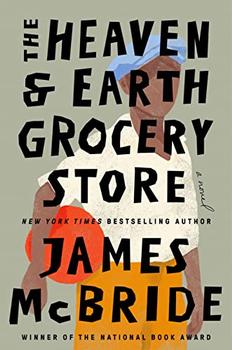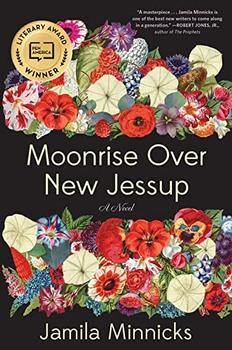Summary | Excerpt | Reading Guide | Reviews | Beyond the book | Read-Alikes | Genres & Themes | Author Bio

A Novel
by James McBrideThe Heaven & Earth Grocery Store by James McBride takes place in Pottstown, Pennsylvania, primarily within the confines of a real-life settlement called Chicken Hill, during the racially contentious 1930s. Chicken Hill's population was largely Jewish and Black, and included Irish, Italian, and Greek immigrants. It was a place where all types of people, united by impoverished circumstances, "pretty much got along," as McBride explains in an interview with NPR, which inspired him to recreate the congenial relationships between his characters. It is this sentiment — of people from different backgrounds relying on the kindness of their neighbors — that holds the novel together.
Opening in 1972 as investigators discover a skeleton at the bottom of an old Chicken Hill well, McBride hits the ground running, setting the stage for an engaging whodunit thriller. But the novel soon turns back the clock to the 1930s and traces the mystery from the source. It evolves into a winding and all-encompassing look at Chicken Hill, its history, and the cast of characters that give it life. Among them is a Jewish couple, strong-willed Chona, the proprietor of the Heaven & Earth Grocery Store who suffers from epileptic seizures and a limp, and her theater-owning husband Moshe. Moshe desperately wants to move off the Hill, to follow other Jewish families to an area of more financial promise, but Chona refuses to leave the grocery store — or the population of children and families she helps through handouts — so on the Hill they stay.
Nate Timblin, a seemingly serene man who is revered by the other Black residents, works under Moshe at the theater, and his wife Addie works with Chona in the Heaven & Earth Grocery Store. Nate and Addie have recently taken guardianship over young Dodo, who was the victim of an explosive kitchen accident that killed his mother and left him almost completely deaf. Soon, Nate gets word that the State is sending men after Dodo, keen on admitting him into Pennhurst, a local mental institution. When Dodo's safety is put in jeopardy, Nate's fatherly affections for the boy give way to an intense inner power struggle — he wants to save Dodo, yet fears undertaking such an emotional and difficult journey might "unleash the evil poison in him" that he fights to keep hidden and under control. One of the most engaging elements of McBride's plot is Nate's secretive past and his gallant efforts to control his demons.
Knowing what the conditions in establishments such as Pennhurst are like (see Beyond the Book), he and Addie immediately take action, going to the community for help. Chona rises above the rest, taking Dodo's safety into her own hands. However, her mysterious illness continues to worsen, limiting her ability to protect him. Worse yet, she is plagued by the ominous and blundering presence of Doc Roberts, the only doctor on Chicken Hill — and a member of the KKK — who harbors a dark obsession with her. Nearly everyone in the neighborhood rallies to protect Dodo — an enduring and poignant example of the power of community that smolders at the center of the novel.
One of the most compelling elements of McBride's writing is its interconnectedness. The finale is a thrilling, Rube-Goldberg-esque sequence of events that culminates in a near perfect ending. The denouement slotted together so well, it redeemed the novel of some of its slower expository segments. Reading some of the chapter-long, detail-heavy sections, I found myself wondering why McBride was tearing me away from the plotline for these tangents. However, I see now that he was playing the long game, setting up future events and hiding little circumstantial Easter eggs. I have a feeling this novel would be an even bigger and more satisfying delight upon the second or even third read. Ultimately, McBride sacrifices some plot momentum in exchange for a shimmering mosaic of characters and histories that we can only see in full once the final page has been read.
At the heart is community, and the tenderness to be found within enduring bonds to one's neighbors. Whether your heartstrings are pulled by the rekindling of a childhood friendship, or Dodo clutching desperately to his only friend as darkness surrounds them, rest assured, they will be pulled. Yet this novel is not without its nuances. You will feel fear, rage, nostalgia, joy, frustration. The Heaven & Earth Grocery Store shows readers that it is possible to connect with people who are radically different from you without relinquishing the things unique to your own experience. Love bursts from the pages of McBride's novel, shining its golden light on the miracles we can accomplish as a community.
![]() This review was originally published in The BookBrowse Review in September 2023, and has been updated for the
December 2023 edition.
Click here to go to this issue.
This review was originally published in The BookBrowse Review in September 2023, and has been updated for the
December 2023 edition.
Click here to go to this issue.

If you liked The Heaven & Earth Grocery Store, try these:

by Tananarive Due
Published 2024
A gripping, page-turning novel set in Jim Crow Florida that follows Robert Stephens Jr. as he's sent to a segregated reform school that is a chamber of terrors where he sees the horrors of racism and injustice, for the living, and the dead.

by Jamila Minnicks
Published 2023
Winner of the 2021 PEN/Bellwether Prize for Socially Engaged Fiction, a thought-provoking and enchanting debut about a Black woman doing whatever it takes to protect all she loves at the beginning of the civil rights movement in Alabama.
Your guide toexceptional books
BookBrowse seeks out and recommends the best in contemporary fiction and nonfiction—books that not only engage and entertain but also deepen our understanding of ourselves and the world around us.